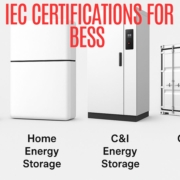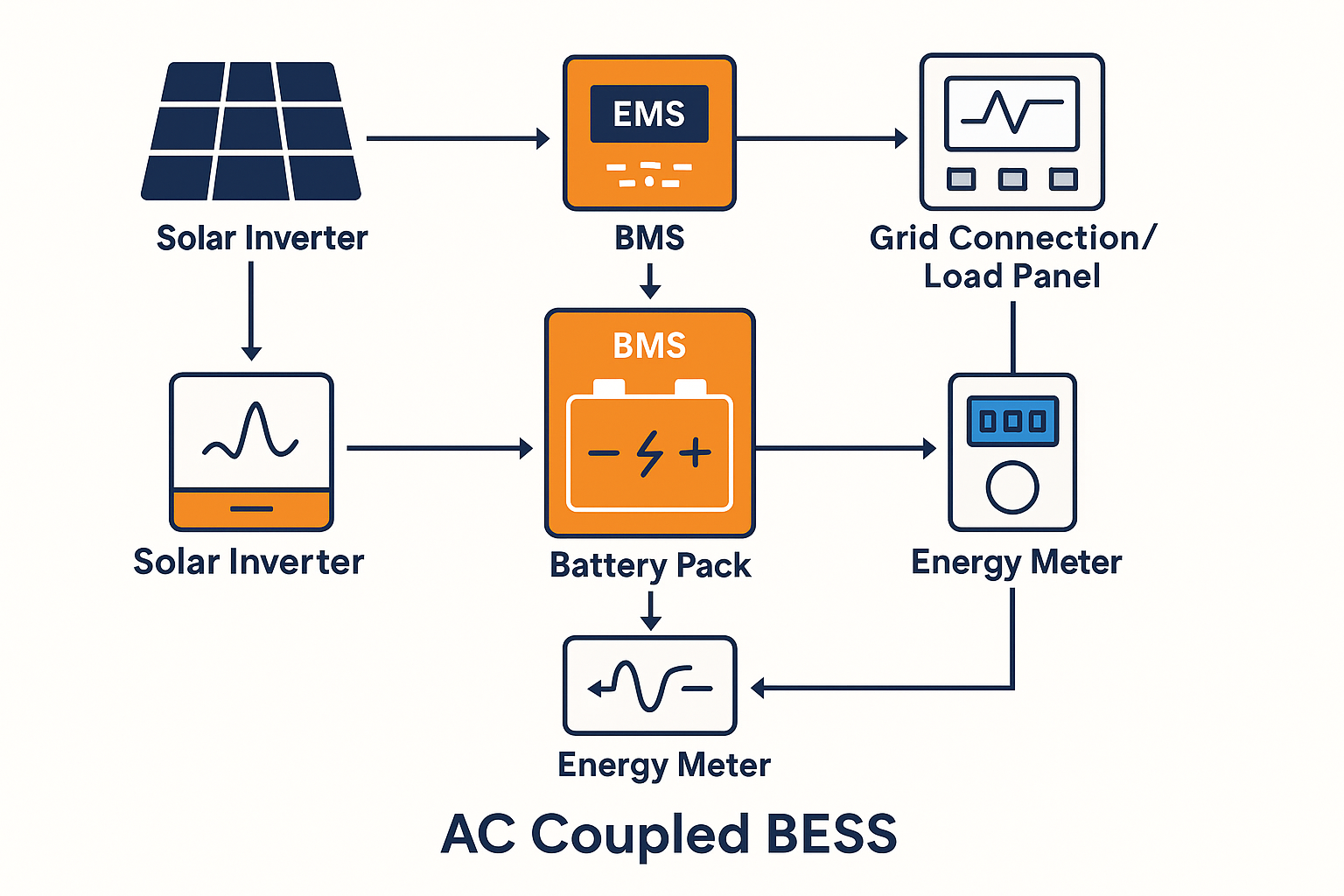IEC Certifications for BESS: The Global Standard for Safety, Performance & Compliance
IEC Certifications for BESS: Battery Energy Storage Systems (BESS) are at the heart of modern energy transition—bridging renewables with grid reliability, enabling peak shaving, and powering homes, businesses, and microgrids. However, with great power comes great responsibility—ensuring these systems are safe, reliable, and compliant. This is where IEC certifications become non-negotiable.
Whether you’re a manufacturer, developer, investor, or end-user, understanding IEC standards for BESS is essential. Let’s explore what they are, why they matter, and how they ensure your system meets international benchmarks.
What Is IEC?
The International Electrotechnical Commission (IEC) is a global organization that prepares and publishes international standards for all electrical, electronic, and related technologies. IEC standards are widely accepted across countries, making them a crucial part of certification for global markets.
???? Why IEC Certification Matters for BESS
IEC certifications ensure:
- Safety: Protects people and infrastructure from battery-related risks like fire, explosion, and electric shock.
- Performance: Verifies that the system delivers its rated capacity, efficiency, and lifespan.
- Grid Compatibility: Confirms the system won’t disrupt power quality or stability.
- Global Market Access: Required for entering many regulated markets in Europe, Asia, and the Americas.
Without proper IEC certification, your BESS project could face project delays, insurance issues, or legal penalties.
???? Key IEC Certifications for BESS
Here’s a list of the most important IEC standards applicable to BESS, from the cell level to the complete system level.
1. IEC 62619 – Safety of Secondary Lithium Cells and Batteries for Industrial Applications
- Focuses on cell and battery safety for industrial use.
- Covers thermal runaway, overcharging, short-circuit protection, and more.
- Mandatory for Li-ion cells and packs used in BESS.
2. IEC 62933 Series – Electrical Energy Storage Systems (EESS)
A comprehensive suite focused specifically on energy storage systems:
???? IEC 62933-1-1: Terminology
- Defines standard terms to avoid ambiguity.
???? IEC 62933-2-1: Safety Requirements
- Covers fire hazards, electrical shock, chemical risks, etc., at the system level.
- Applies to all types of EESS, not just lithium-based ones.
???? IEC 62933-4-1: Environmental Issues
- Addresses EMC (Electromagnetic Compatibility), noise, vibration, and pollution aspects.
3. IEC 61508 – Functional Safety of Electrical/Electronic Systems
- A core functional safety standard.
- Essential when the BESS integrates with critical infrastructure or automation systems.
- Helps determine Safety Integrity Levels (SIL).
4. IEC 62040 Series – Uninterruptible Power Systems (UPS)
- Relevant if your BESS includes or interacts with UPS systems.
- Covers performance, safety, and EMC compliance.
5. IEC 61000 Series – Electromagnetic Compatibility (EMC)
- Ensures your BESS does not emit or fall victim to EM interference.
- A must for grid-tied systems to maintain power quality and communication integrity.
6. IEC 61439-1 & IEC 61439-2 – Low Voltage Switchgear and Controlgear Assemblies
- Applies to battery cabinets, switchboards, and power distribution components.
- Critical for safe handling and switching of high-voltage DC and AC circuits in BESS.
7. IEC 62109-1 & 2 – Safety of Power Converters for Use in PV and ESS
- Covers PCS (Power Conversion Systems) and inverters.
- Ensures converters don’t pose electrical, thermal, or mechanical hazards.
8. IEC 60730 / IEC 60335 – Control Functions and Household BESS
- For home energy storage systems, especially hybrid inverter-battery units.
- Ensures user-level safety for residential installations.
???? Beyond Individual Components: System-Level Certification Is Crucial
It’s not enough to show cell or inverter certificates. An entire BESS system must be tested and certified as a whole.
Why?
- Different brands/components interact differently.
- Fire suppression, wiring, EMS logic, and enclosure design affect safety.
- Authorities and insurers need proof that the assembled system works safely under real-world conditions.
???? If you’re buying or installing a BESS, ask for the full system IEC test reports, not just cell-level documents.
???? Regional Requirements Based on IEC
While IEC is international, many countries adopt and localize these standards:
- Europe (CE): IEC standards are often harmonized with EN standards for CE marking.
- India (BIS): BIS aligns many of its safety norms with IEC, especially for Li-ion storage.
- China (GB Standards): Often derived from IEC benchmarks, though some are uniquely localized.
- Australia & New Zealand: Follow AS/NZS standards largely based on IEC.
- Middle East & Africa: Utilities require type-approved systems tested to IEC standards.
???? Documents to Request from Your Supplier
Before buying or installing a BESS, ask for:
- IEC 62619 Cell & Pack Certification
- IEC 62933-2-1 System-Level Safety Certificate
- PCS/Inverter IEC 62109 Reports
- BMS Compliance Documents
- EMC Reports (IEC 61000 Series)
- Type Test Report of Full Battery Rack or Container
If these are unavailable, it’s a red flag. You might be dealing with an uncertified, risky product.
???? Common Pitfalls to Avoid
- Assuming cell certificates are enough
- Using self-built systems without third-party testing
- Mixing components without system-level integration testing
- Skipping fire protection compliance
✅ Final Thoughts: IEC Certifications for BESS Is Not Optional
In the rapidly growing energy storage market, shortcuts are tempting—but dangerous. IEC certifications are not just documents; they’re your first line of defense against accidents, project rejections, and long-term failure.
So whether you’re developing a grid-scale BESS or installing a home backup system, insist on IEC-certified solutions. Your safety, investment, and reputation depend on it.
???? Got Questions About IEC Certifications for BESS?
As a New Energy Consultant, I help clients source, validate, and inspect certified energy storage systems across Asia. If you’re unsure about your battery supplier’s documents or want help with third-party testing, feel free to reach out.



